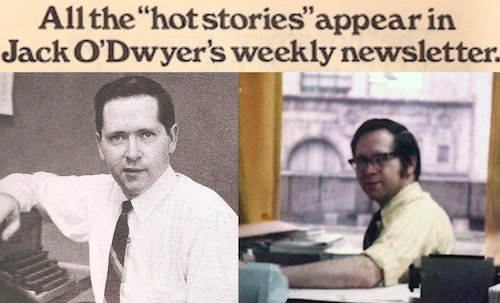 |
| Larry Smith |
I’ve been fortunate enough in my career to have worked in some big towns and to have met some big people. No question, though, I never met a bigger one than Richard S. Levick, Esq., who died this spring at the age of 65. It’s appropriate, perhaps, that his death occurred in the season of rebirth, for Richard was all about rebirth in his personal life as well as in his work. He was ever zealous for the next frontier, ever remaking himself and the communications firm he founded in the late 1990s.
We first knew each other as a journalist (me) and a PR guy (him). In late 1999, he asked me what I was doing for the rest of my life. At that early time in its history, the LEVICK firm—then Levick Strategic Communications—did mainly one thing, which was promoting lawyers and their thought leadership in the media. As you can imagine, that market matured to senescence in predictably short order.
We were hustling for law firm work when the call came in from a client who wanted to know if we did crisis. His client, a beleaguered order of the Catholic Church, needed help. Oh brother, did they! That was our breakout moment. We followed our best instincts, immersed ourselves in the client’s strangely secretive culture and achieved tangible lasting results. Voila, “the father of modern crisis communications,” as he’s often depicted, suddenly emerged on the scene.
Richard quickly recognized that crisis work was both profitable and invigorating, much more so than counting media placements for law firms. As Richard’s reputation grew, our work quickly moved beyond crisis management and morphed into long-term institutional client relationships that wouldn’t simply end when the crisis did.
It was a period of immense excitement, of endless possibility—reputation management and public affairs and litigation communications merging together. Richard’s eye for these disciplines amazed me. I hardly knew what litigation communications meant until we found ourselves helping Rosie O’Donnell prevail against her former publisher. We were in court every day; a lot of law firms can’t make that claim.
More than simply business decisions, Levick’s growth through these fundamental diversifications bespoke Richard’s hunger for adventure, for the new, for life in all its sundry crevices. In that sense, he was among the lucky ones whose life and work are inseparable. And the rest of us were lucky—I was certainly lucky—to ride along with him every step of the way. He loved the “Big Table” metaphor, he loved bringing back old colleagues to work on client matters, including colleagues he might have bickered with or even fired five or ten years earlier.
No wonder the LEVICK firm attracted so much talent over the years: Congressional staffers, politicians, trade association veterans, journalists, former regulators, Internet pros, financial communications people who spoke the language of Wall Street as though it were their native tongue. At the very least, working with Richard would be an adventure. At the very most, the sky might well be the limit.
He was a big-picture guy in every way. He bristled when widget manufacturers would question our lack of knowledge about widgets. He said they just didn’t understand what the communications game was all about, and he was right.
So, Richard set out to teach them. He’d speak to the UN General Assembly if he could, or to a local convention of florists or plumbing supply distributors if needed. Richard bedazzled them all and, no surprise, he became a TV fixture, one of the pundits to call whenever a corporate disaster made headlines. His was a marketing whirlwind the likes of which I had never seen before. And it went on for decades, his energies accelerating at a torrential pace.
When he’d give presentations on crisis communications, it was, like all his presentations, a joyous and ebullient occasion. That might seem counter-intuitive. After all, crisis involves mainly blood, sweat and tears. How can it be joyous and ebullient? But it was, because it was work and work is life. So, according to the Gospel of Richard Levick, sit back and enjoy the show!
It wasn’t difficult for me to enjoy the show. The show was, after all, suffused with humor from Day One. For whatever reason, of the gazillion examples, a very small one persists in my memory. Richard had asked me to write a dunning letter to a recently departed client. I wrote one with the standard opener, “Dear Tom, This letter is in reference to outstanding Invoice XXX.” Richard suggested I replace that opener with one of his own: “Dear Tom, As Lyndon Johnson used to say, ‘I come to you with a heavy heart …’”
Humor? Richard Levick? Ya think? In the last few weeks of his life, he said to some of us, “Well, the good thing about dying is that I won’t have to pay any more alimony.”
Yeah, he could be outrageously funny about himself yet so seriously self-critical when the stakes were high—for the firm, or for clients, or for his friends. Never think that Richard Levick was a frivolous man. In any profile of Richard, on any list of his salient virtues, the word courage easily takes top spot. He never minded exposing himself to criticism and if, in the hurly-burly of professional competition, that criticism might turn into personal attacks, he took it in stride. He knew it was part of the game that he himself had signed on to play.
But it was when we represented a group of Kuwaitis, locked away in the Guantanamo detention center, that Richard’s courage stood him ten feet tall.
Richard was a deep believer in the mantra that everyone deserves qualified counsel. Op-ed writers castigated him and our firm for the work we did on behalf of the detainees. We were portrayed as a crew of hucksters willing to help destroy Western Civilization for a fast and dirty buck. A few of our other clients raised eyebrows. Within the firm, some employees, especially among the younger ones, were appalled. To these valued colleagues, we tried to explain that our subtextual client, our real client, was the Supreme Court of the United States, whose values and rulings we were working to help effectuate. We spoke from the heart, we were never glib, and I believe we succeeded in reaching them.
But Richard’s moment of greatest courage came decades later as the multiple ruthless malignancies proliferated daily. The pain intensified, and the cancer was intractable. I’ve seen people die well and bravely before, but not like this. Suffice it to say that, up until the end, he was doing the business he loved. Two colleagues arrived each day at the hospice to coordinate the work.
Richard was on the phone from morning to night with friends, relatives and co-workers. I didn’t want to burden him, so I’d send texts praising the Red Sox and damning the Yankees. If he replied, I’d know it was okay to call.
“It’s so unfair,” a former colleague who loved him wrote to me. He was only 65, so maybe it was indeed remarkably unfair. But no one who spoke to Richard in those last days would hear anything like that from him. He was too busy to waste his precious time on that kind of thinking, too busy arranging practical matters that affected people for whom he felt responsible and too busy reassuring the countless friends who loved him that he loved them in return.
How hard it is when a life force leaves this planet. Lord knows this planet needs as many life forces as it can get. It’s harder still when that force has touched so many lives and done so much for each of them. Richard’s innumerable friends can derive comfort in knowing that he’s now taken his place among the legends of our profession, which is exactly where he belongs.
***
Larry Smith joined LEVICK in 2000. He was Senior Vice President until 2017.


 The news of Bruce Willis' frontotemporal dementia diagnosis hit me like a ton of bricks. My client Ginger Reeder, who was VP-corporate communications at Neiman Marcus, has the same dreaded disease.
The news of Bruce Willis' frontotemporal dementia diagnosis hit me like a ton of bricks. My client Ginger Reeder, who was VP-corporate communications at Neiman Marcus, has the same dreaded disease.



 Have a comment? Send it to
Have a comment? Send it to 
No comments have been submitted for this story yet.